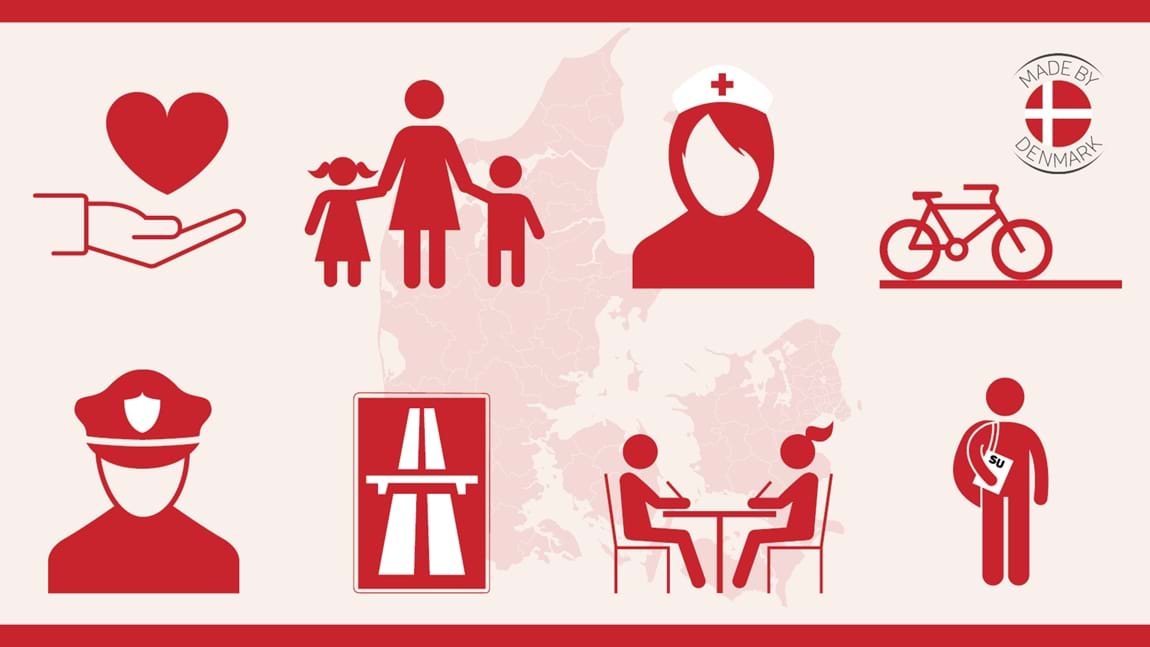New map: Companies contribute DKK 550 billion to Danish welfare
The Confederation of Danish Industry has compiled a new map charting how many billions of kroner companies and their employees in each municipality contribute to welfare through taxes. In Viborg Municipality, for example, companies contribute DKK 6.8 billion in taxes per year, but there is far too little focus on that, says Palle Damborg, owner of Jysk Display in Viborg.
DKK 550 billion.
That’s how much Denmark’s companies and their employees contribute to the public purse each year – corresponding to half of total public sector expenses, shows a new study from the Confederation of Danish Industry (In Danish)
“The tax contribution of companies and their employees amounts to DKK 550 billion. That’s enough to cover all expenses for our healthcare system, social welfare for our children, elderly, disabled people and socially vulnerable people, the total state pension and all investments in roads, schools, nursing homes and research, among other things. And they do that every year,” explains Kim Graugaard, Acting CEO at DI.
He emphasises that the size of the companies’ so-called “welfare footprint” is greatly dependent on whether or not they are able to hire the qualified employees they need.
“If companies are to be able to deliver a still greater contribution to our welfare system, it’s crucial that they’re able to continue hiring talented employees. That is the driving force behind companies’ welfare footprint. Unfortunately we find ourselves in a situation where certain politicians are discussing changing the pension system and giving some Danes the right to earlier pension – and at the same time they’re sceptical towards bringing in more qualified foreign workers,” says Kim Graugaard and continues:
“In the worst case, this could mean that we end up setting major limitations on the growth we create, and thereby also what we can afford here in Denmark.”
Some people may have the impression that there is one side that only talks about growth and businesses while the other side is focussed on welfare. But in reality the two are interdependent, and there is every reason to make that link clear. Ulrik Wilbek, Mayor of Viborg Municipality
22,300 local full-time jobs in Viborg Municipality
DI’s map makes it possible for the first time to see how big the welfare footprint of companies is in each individual municipality.
For example, in 2017 companies in Viborg Municipality generated 22,300 local full-time jobs, and companies and their employees contributed approximately DKK 6.8 billion in taxes to national welfare. For that amount the country can, for example, teach 26,600 students in primary school, employ 4,500 social and healthcare workers and 2,500 police officers and build 19 km worth of motorway – every year.
“Looking at the numbers as a businessman, I’m not actually surprised, because we’re in the middle of an upswing, and things are going well for companies. But in general I think that companies’ contribution is grossly underestimated. Danes aren’t always aware of where the money really comes from,” says Palle Damborg, owner of the Viborg-based company Jysk Display A/S, which produces stands for fairs.
He is therefore pleased that companies’ contribution has now been tallied up – and distributed across the country’s municipalities.
“We can use the numbers to enhance our dialogue with politicians about the business climate. Local politicians in Viborg Municipality have taken many positive steps, for example by removing the reimbursement duty, but we still have serious difficulties with infrastructure, because we have no connection to the motorway network. That’s an area where action is required – both at local and national level,” emphasises Palle Damborg.
He also believes that politicians ought to be cognisant of the possibility of harder times ahead, after the upswing. In that case, companies will need better business conditions if they are to continue contributing as much to welfare.
See also: New figures: Still fewer Danes on public benefits
Companies are deeply engaged in society
The social contribution of companies does not come as a surprise to Mayor of Viborg Municipality Ulrik Wilbek. In his experience, companies in the municipality take on a big share of the responsibility for the development of the municipality and contribute through social responsibility, cultural involvement and active involvement in the development of citizen’s leisure time and much more.
“It’s my impression that this is also the case in other municipalities. We make sure to include companies in development plans, and we help them by ensuring fast and flexible case processing in building projects and local planning, so that’s not what stands in the way of companies deciding to establish themselves and stay in the municipality,” says Ulrik Wilbek.
He believes that it is important to highlight the fact that well-functioning companies and growth are a prerequisite for providing citizens with the good frameworks and public services that ensure that everyday life runs smoothly.
“Some people may have the impression that there is one side that only talks about growth and businesses while the other side is focussed on welfare. But in reality the two are interdependent, and there is every reason to make that link clear,” says the mayor.
See also: New record: Denmark’s patent applications soar
Denmark needs strong companies
Viborg Municipality is just one of Denmark’s 98 municipalities, all of which have different conditions for creating a good business climate – depending on factors such as size, demography and location. But nonetheless the numbers are telling, says Kim Graugaard, Acting CEO at DI.
“We cannot have a strong society in Denmark without strong companies that create growth and jobs all over the country. And meanwhile, companies can’t do without the schools, daycare options and infrastructure that the public sector provides. This is the positive circle we have in Denmark that is so vital for our success.”
That is why Kim Graugaard believes that DI’s study of the company’s welfare footprint will help enhance the debate about the interplay between the private and public sector.
“It is typically conversations about what our common funds should be spent on that form the focus of debates. With our map of the corporate welfare footprint, we want to emphasise where the money comes from and hopefully encourage both citizens and politicians to view the questions of companies’ business conditions as a natural part of the discussion about how we ensure a good welfare society in Denmark. Especially during an election year.”
See also: OECD: The Escape Route from Poverty is Shortest in Denmark


